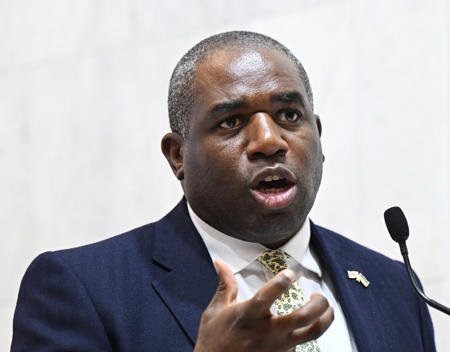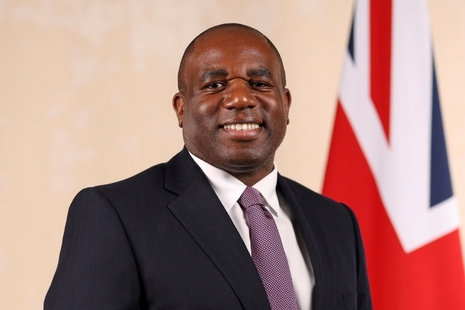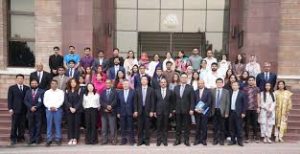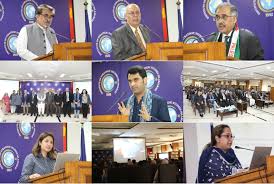Climate crisis: a defining challenge for our time, says Foreign Secretary David Lammy

Celina Ali
Islamabad: In a landmark speech delivered at the historic Kew Gardens on Wednesday, newly-appointed Foreign Secretary David Lammy outlined his vision for tackling the climate crisis as a cornerstone of British foreign policy.
In what was his first major foreign policy speech since taking office, Lammy emphasized that action on climate is not just a matter of environmental concern, but a key issue of national security, global prosperity, and the future of humanity.
Addressing the world’s most urgent crisis, Lammy’s speech touched upon the profound challenges posed by climate change and biodiversity loss, and the moral responsibility to address these issues head-on. The Foreign Secretary made clear that the climate and nature emergency is the defining challenge of our age, highlighting how the crisis is intricately linked to global security, economic stability, and health.
Lammy’s message was clear: “Action on climate is action on our security, our prosperity, and our future.”

He argued that the climate emergency is not an isolated policy issue but a systemic global threat, driving conflicts, migration, and health crises. From rising temperatures in the Arctic sparking geopolitical competition to devastating hurricanes in the Caribbean, Lammy illustrated how climate change exacerbates global instability.
“The climate threat may not feel as urgent as a terrorist or an imperialist autocrat,” Lammy said. “But it is more fundamental. It is systemic. It’s pervasive. And it’s accelerating towards us.”
He pointed to migration, with climate change predicted to displace 200 million people by 2050, and health, where the World Health Organization has deemed climate change the greatest threat to human health. The COVID-19 pandemic, Lammy noted, demonstrated how environmental crises can quickly evolve into global health emergencies.
Lammy announced the formation of a ‘Global Clean Power Alliance,’ aimed at accelerating the transition to renewable energy worldwide. Britain, he said, is committed to being the first major economy to achieve clean power by 2030, leveraging its expertise to build international coalitions.
“The world is racing to control critical minerals, just as great powers once raced for oil,” Lammy remarked, noting the geopolitical dimensions of the clean energy transition. The Alliance would focus on scaling up investment in renewable energy, particularly in developing nations, where access to clean power is a major challenge.
He also focused on the need to unlock climate finance, particularly for the Global South, which bears the brunt of climate impacts but receives a fraction of international support. He highlighted Africa’s vulnerability, pointing out that while the continent is on the frontlines of climate change, it receives just 3% of global climate finance.
The Foreign Secretary called for systemic reform of global financial institutions to address these imbalances, committing to lead the G7 in advocating for institutional reforms that enable developing countries to access climate finance more easily.
A key theme in Lammy’s speech was the urgent need to halt and reverse biodiversity loss. He referenced alarming statistics: a million species are on the brink of extinction, and wildlife populations have plummeted by 69% since 1970. Lammy reaffirmed the UK’s commitment to protecting 30% of the planet’s land and oceans by 2030 and endorsed the High Seas Treaty and Plastics Treaty as essential steps toward safeguarding global biodiversity.
Lammy also pledged to expand UK-supported initiatives in the Congo Basin rainforest, the world’s second-largest, as part of a broader effort to restore ecosystems and protect indigenous communities, whom he praised as nature’s “best custodians.”
In a personal moment, Lammy shared how his own connection to nature was shaped by his Guyanese heritage and his work establishing a conservation center in the rainforests of Guyana with his wife. He reflected on a conversation with Sir David Attenborough, linking their shared commitment to the concept of stewardship of the natural world—a responsibility to preserve the planet for future generations.
“There will be no global stability without climate stability,” Lammy stated, emphasizing that a more equal partnership between the Global North and Global South is crucial for tackling the crisis.
Lammy underscored the need for Britain to reset its approach to climate diplomacy, rejecting the “do as I say, not as I do” mentality. He pointed to domestic initiatives already underway, such as lifting the ban on onshore wind, ending new oil and gas licenses, and expanding the Blue Belt marine protection program. “Our goal is simple,” Lammy said. “A liveable planet for all, now and in the future.”
As Britain takes a leading role on the world stage, Lammy’s vision sets a bold, progressive course for integrating climate action into the heart of foreign policy—a move he deems essential for ensuring a secure and prosperous future for all.





